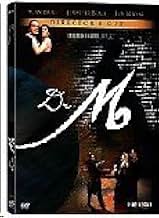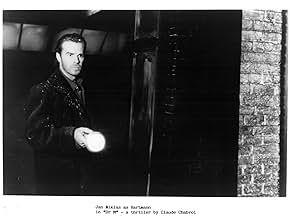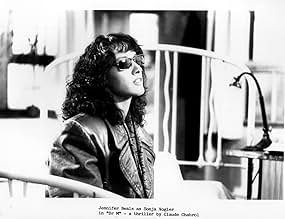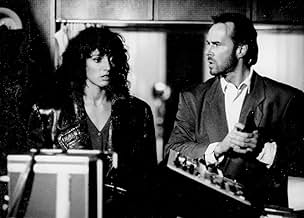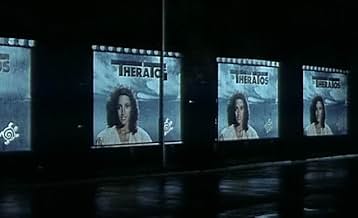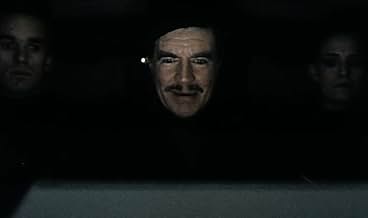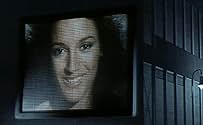अपनी भाषा में प्लॉट जोड़ेंInvestigating a series of suicides, police detective reveals a sinister plot.Investigating a series of suicides, police detective reveals a sinister plot.Investigating a series of suicides, police detective reveals a sinister plot.
फ़ीचर्ड समीक्षाएं
There is a massive wave of suicide in Berlin, some of them causing accidents with hundreds of casualties on both sides of Berlin. The population believes it is caused by a virus and there is an exodus of Berliners that travel through Club Theratos, an agency promoted by the model Sonja Vogler (Jennifer Beals) in several screened billboards, television and magazines. In West Berlin, Lt. Klaus Hartman (Jan Niklas), who lost his wife Nina two years ago after committing suicide, and his partner Sgt. Stieglitz (Benoît Régent) are relentless in the investigation. He believes that the suicides are murders indeed. When the snoopy journalist from Eastern Berlin, Moser (Hanns Zischler), breaks in the Club Theratos, he finds that the owner Heinrich Marsfeldt (Alan Bates) is the responsible for the deaths, and is using his stepdaughter Sonja to hypnotize the population. Further, he intends to use the popular show of the host Veidt (Peter Fitz) to induce the viewers to commit suicide. Will Hartman and Sonja be capable of stopping his evil plan?
"Dr. M" (1990) is a different movie by Claude Chabrol with a futuristic view of Berlin, the same way Jean-Luc Goddard made "Alphavile" in 1965 meaning a different genre from these two filmmakers. The plot is confused, and it is never clear whether Dr. Marsfeldt is only lunatic or has the interest to increase business in his travel agency. But why the police officer is helping him? In the end, this film seems better when watched for the second time, although totally different from Chabrol's style. My vote is six.
Title (Brazil): "Dr. M - Dr. Mabuse e Seu Destino" ("Dr. M - Dr. Mabuse and His Fate")
"Dr. M" (1990) is a different movie by Claude Chabrol with a futuristic view of Berlin, the same way Jean-Luc Goddard made "Alphavile" in 1965 meaning a different genre from these two filmmakers. The plot is confused, and it is never clear whether Dr. Marsfeldt is only lunatic or has the interest to increase business in his travel agency. But why the police officer is helping him? In the end, this film seems better when watched for the second time, although totally different from Chabrol's style. My vote is six.
Title (Brazil): "Dr. M - Dr. Mabuse e Seu Destino" ("Dr. M - Dr. Mabuse and His Fate")
A Frenchman directing mostly Germans speaking awkward phonetic English--that's just one of the problems here, but it's a big one, since so many of the actors here stiltedly handle dialogue that would be problematic under ideal circumstances. The only person here who seems to have a firm grip on what he's doing is Alan Bates, who chooses to play his media-mogul villain role for arch comedy. As a result, he seems to be in a different movie, so at least this one doesn't embarrass him like the luckless other performers.
Jennifer Beals has the right droning, narcotic quality in scenes where she's the hypnotic face/voice of sinister advertisements, but elsewhere she has to rely on her acting abilities, which are limited as usual. Jan Niklas has apparently been excellent elsewhere, but he's dreadful here as the noirishly cynical investigating hero. Andrew McCarthy has exactly one brief scene as an assassin--he does get special billing, but it's neither a cameo or supporting role, just a straight-up bit part (I hope he fired his agent after this).
Many people have said this film doesn't make much sense. and I'll have to take their word for it--it's so turgid I might well have not paying attention if/when there were elements that did somehow explain things. There's an inexplicable suicide epidemic in a faintly futuristic Berlin. Like Francois Truffault before him (in "Fahrenheit 451"), Chabrol has no particular feel for sci-fi or dystopian fantasy, despite OK production design. He doesn't even try to build suspense around the possibility of sudden violent death at any moment, and the deaths when they occur are indifferently staged.) There are ridiculous scenes in a quasi-fascist quasi-punk club where everyone dresses in designer black; they dance like performance artists trying cluelessly to imitate a mosh pit. There's also one of those hysterically pretentious sex scenes in which naked gyrations (Beals no doubt using a body double) are intercut with archival footage of nuclear explosions, war crimes, etc. Oh, the humanity. Things get even sillier when the protagonists go to a bizarre "resort"--hence the retitling "Club Extinction"--that's like Club Med meets Jonestown meets "The Prisoner."
Unfortunately, the whole film is so misconceived and lifeless there's little camp entertainment value to its mess. One among "Dr. M's" many misfortunes is that it was filmed in 1989, and the script makes much of tensions between Wall-separated East and West--but of course that division had collapsed by the time it came out.
Jennifer Beals has the right droning, narcotic quality in scenes where she's the hypnotic face/voice of sinister advertisements, but elsewhere she has to rely on her acting abilities, which are limited as usual. Jan Niklas has apparently been excellent elsewhere, but he's dreadful here as the noirishly cynical investigating hero. Andrew McCarthy has exactly one brief scene as an assassin--he does get special billing, but it's neither a cameo or supporting role, just a straight-up bit part (I hope he fired his agent after this).
Many people have said this film doesn't make much sense. and I'll have to take their word for it--it's so turgid I might well have not paying attention if/when there were elements that did somehow explain things. There's an inexplicable suicide epidemic in a faintly futuristic Berlin. Like Francois Truffault before him (in "Fahrenheit 451"), Chabrol has no particular feel for sci-fi or dystopian fantasy, despite OK production design. He doesn't even try to build suspense around the possibility of sudden violent death at any moment, and the deaths when they occur are indifferently staged.) There are ridiculous scenes in a quasi-fascist quasi-punk club where everyone dresses in designer black; they dance like performance artists trying cluelessly to imitate a mosh pit. There's also one of those hysterically pretentious sex scenes in which naked gyrations (Beals no doubt using a body double) are intercut with archival footage of nuclear explosions, war crimes, etc. Oh, the humanity. Things get even sillier when the protagonists go to a bizarre "resort"--hence the retitling "Club Extinction"--that's like Club Med meets Jonestown meets "The Prisoner."
Unfortunately, the whole film is so misconceived and lifeless there's little camp entertainment value to its mess. One among "Dr. M's" many misfortunes is that it was filmed in 1989, and the script makes much of tensions between Wall-separated East and West--but of course that division had collapsed by the time it came out.
This is not a good film. Check out the rave reviews. They are left from people who think they have more intellect than you. They make comments like "most people won't understand this movie."
That's poor writing not superior intelligence.
The film is a very low budget fare. The story line is not compelling. And who cares if it's a quasi remake of Dr. Mabuse? So it's a bad version of it.
It reminds me more of Alphaville than Dr. Mabuse. Just not as good.
That's poor writing not superior intelligence.
The film is a very low budget fare. The story line is not compelling. And who cares if it's a quasi remake of Dr. Mabuse? So it's a bad version of it.
It reminds me more of Alphaville than Dr. Mabuse. Just not as good.
To begin with, I vividly recall reading the mixed newspaper review of this one when it was surprisingly released locally; needless to say, I missed it at the time and, until earlier this year, never again did I have the opportunity to check it out. In fact, it turned up – alas, dubbed – on late-night Italian TV and, though I did record it, I recently opted to acquire the English-language version
which is just as well, since two deleted scenes were included in the package! Anyway, knowing the flak the film has received (which was practically universal), I really did not know what to expect from it. However, I must say that I liked it quite a bit, while acknowledging it cannot hold a candle to any of Fritz Lang's movies revolving around the influential figure of criminal mastermind Dr. Mabuse (here, the name has even been changed to Marsfeldt!). Incidentally, the actor most identified with the role (in a revival series of 1960s low-budget efforts) i.e. Wolfgang Preiss appears here as the Chief Of Police!
Perhaps the film does at times feel like one of the many German TV cop shows which have flooded the market from the 1970s and still continue to this day, but there is no denying the grip of the narrative (which tried, but unfortunately failed, to be prophetic when the Berlin Wall got torn down only months before the picture debuted!). Equally striking is the imagery pertaining to mass suicide (the most disturbing being a child waiter in full view of the patrons at a swank and busy restaurant), media manipulation and wasted disco-crazy youth (appropriately bleak though, I concede, not all that original).
The intense performances are also a plus: particularly Alan Bates as the outwardly charming but obviously sinister Dr. M and Jan Niklas as the disenchanted yet dogged cop on his trail of terror, though heroine Jennifer Beals proves no mere purveyor of eye candy either. Indeed, Bates' occasional resort to hamminess (especially when he passes himself off as a psychedelic guru at a desert holiday resort and spouting his nihilistic credo to an incredulous, disgusted Beals and Niklas during the climax – set in the Doctor's obligatory 'control room' – all the while connected to a life-support system!) are perfectly in keeping with the fanciful goings-on. The eclectic cast also includes the likes of Euro-Cult regular William Berger, future Italian TV presenter Daniela Poggi and former "Brat Pack"-er Andrew McCarthy in small roles.
In the end, while it may fall short of Chabrol's best work, the film nonetheless makes for a thought-provoking, stylized and yet entertaining parable on our less-than-reassuring times (incidentally, its suggestion/fear of the millennium as the 'end of days' is pretty amusing at this juncture).
Perhaps the film does at times feel like one of the many German TV cop shows which have flooded the market from the 1970s and still continue to this day, but there is no denying the grip of the narrative (which tried, but unfortunately failed, to be prophetic when the Berlin Wall got torn down only months before the picture debuted!). Equally striking is the imagery pertaining to mass suicide (the most disturbing being a child waiter in full view of the patrons at a swank and busy restaurant), media manipulation and wasted disco-crazy youth (appropriately bleak though, I concede, not all that original).
The intense performances are also a plus: particularly Alan Bates as the outwardly charming but obviously sinister Dr. M and Jan Niklas as the disenchanted yet dogged cop on his trail of terror, though heroine Jennifer Beals proves no mere purveyor of eye candy either. Indeed, Bates' occasional resort to hamminess (especially when he passes himself off as a psychedelic guru at a desert holiday resort and spouting his nihilistic credo to an incredulous, disgusted Beals and Niklas during the climax – set in the Doctor's obligatory 'control room' – all the while connected to a life-support system!) are perfectly in keeping with the fanciful goings-on. The eclectic cast also includes the likes of Euro-Cult regular William Berger, future Italian TV presenter Daniela Poggi and former "Brat Pack"-er Andrew McCarthy in small roles.
In the end, while it may fall short of Chabrol's best work, the film nonetheless makes for a thought-provoking, stylized and yet entertaining parable on our less-than-reassuring times (incidentally, its suggestion/fear of the millennium as the 'end of days' is pretty amusing at this juncture).
I wanted to like this and I did for what it could have been and not the sorry mess it turned out to be ..... I even enjoyed the auto smash it turned into because all the ingredients were there but didnt get used ...
Brave concept ..crap realization .... but I do love B Grade sci Fi so I got off on it for the crap it was ... If you like the Outer Limits this one is for you sorta like "the boy and his dog" that thought too much and tried too hard ... woof
Brave concept ..crap realization .... but I do love B Grade sci Fi so I got off on it for the crap it was ... If you like the Outer Limits this one is for you sorta like "the boy and his dog" that thought too much and tried too hard ... woof
क्या आपको पता है
- ट्रिवियाAlthough director Claude Chabrol was famous for his extreme admiration for Alfred Hitchcock, who is frequently referenced in Chabrol films, he eventually came to believe that Fritz Lang was an even more important film-maker, once telling an interviewer that "without Lang, there would be no Hitchcock". This film was designed specifically as an elaborate tribute to Lang and was released in 1990, the centenary year of Lang's birth.
- कनेक्शनFollowed by Doctor Mabuse (2013)
टॉप पसंद
रेटिंग देने के लिए साइन-इन करें और वैयक्तिकृत सुझावों के लिए वॉचलिस्ट करें
- How long is Dr. M?Alexa द्वारा संचालित
विवरण
- चलने की अवधि1 घंटा 56 मिनट
- रंग
- ध्वनि मिश्रण
- पक्ष अनुपात
- 1.66 : 1
इस पेज में योगदान दें
किसी बदलाव का सुझाव दें या अनुपलब्ध कॉन्टेंट जोड़ें

